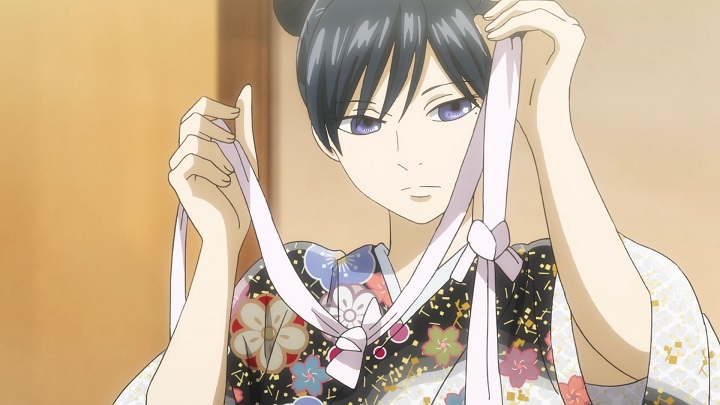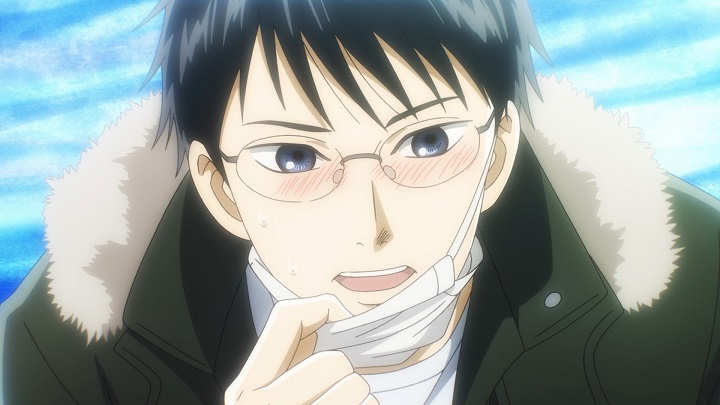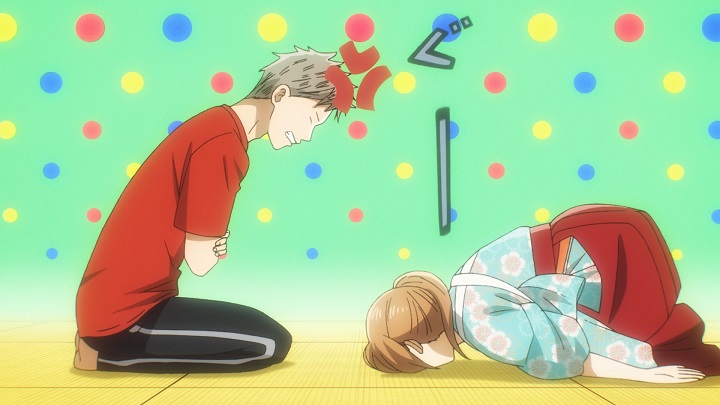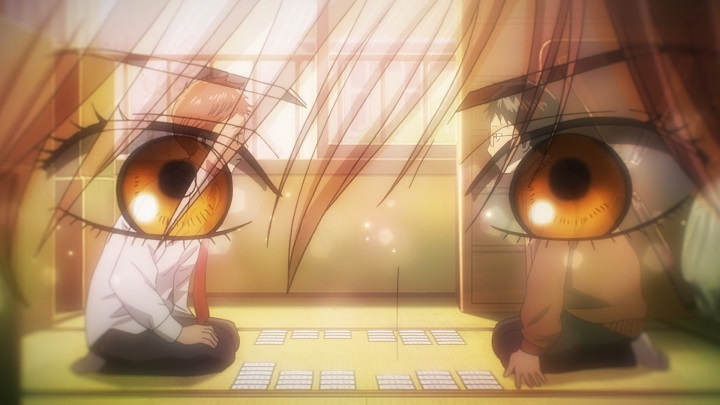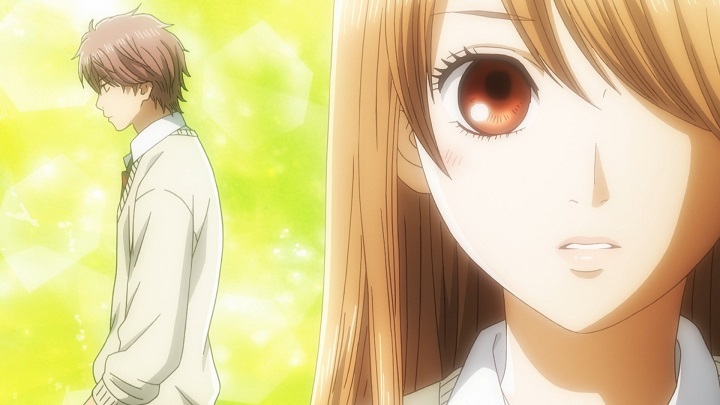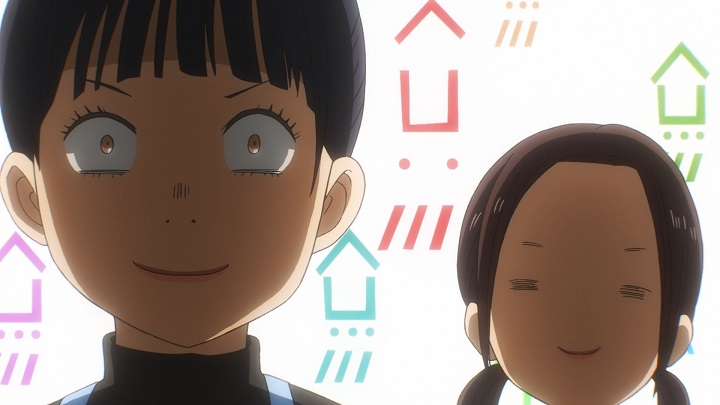It’s time for a Chihayafuru Super Post, to borrow a term from fellow blogger Amunchet. These episodes have been on the back burner for a couple weeks now, owing to my increasingly busy work schedule. The one that prompted me to push them onto my to do list, though, was number 20 (“May the Scarlet Kadsuras”). There was some sloppiness to its shot transitions that made it feel almost unfinished, which was discouraging as a longtime fan of the series. I’ll explain what I mean by that in a bit, as beyond the “Continue Reading” link I’ll be dedicating a few hundred words to each of these three episodes. The last two installments of the season ought to get their own posts, so I hope you’ll forgive this one-off cram session. Hit the jump for some conflicted thoughts on the final leg of Chihayafuru’s third season.
Episode 20: “May the Scarlet Kadsuras”
Let’s start with the sloppy transitions I mentioned in the previous paragraph. The worst offender comes at 7:52 in this episode – a closeup of Shinobu looking at her Daddy Bear-patterned tasuki and thinking about Chihaya. The show wanted to transition from that shot directly to the object of her thoughts, so it made the background translucent and put the next shot behind it. However, the editing team neglected to use a fade effect between these visual states, which is something Chihayafuru does all the time. Since this show operates on a panel-to-screen process, it often fades between overlapping images, but it’s almost as though someone was struck with temporary blindness while QC-ing this episode. This problem cropped up three times in “Scarlet Kadsuras,” which means my attention was pulled away from the story and characters three times.
Not a great start to a pivotal episode like this one, which concludes Suo and Harada’s Meijin title match. Even if we put aside the visual gaffes, their games here didn’t particularly excite me. Suo’s manipulative playstyle did surface at a good time in game 4, baiting Harada into faulting in a luck of the draw scenario. Game 5, though, was a blowout topped with some “I was so close!” narration from the loser; Arata’s sickly declaration of war afterwards was far more exciting. The standout moment was centered, of course, on Inokuma, whose fresh acceptance of her defeat was violently unearthed by reader Yamashiro-san. From the elder Yamashiro’s perspective, Inokuma’s youth creates the illusion that she’s standing still, with unlimited possibilities remaining before her. Her third pregnancy may necessitate a break from the game, as Inokuma planned, but hearing that someone expected her to return caused the floodgates to open. The moment when she turned to Sakurazawa and cried was a deeply human display, and a nice show of closeness between two friends at a point in their lives that anime rarely shows us.
Episode 21: “To Restore My Faith”
Ever since Taichi’s second place finish at the Yoshino Tournament, he’s been playing second fiddle to the rest of the main cast (plus some big supporting members). That finally changed with episode 21, which separated him from the Mizusawa gang for the Takamatsu Memorial Cup. I’m conflicted about this decision, because while it gave Taichi a personal, karuta-related objective, the series linked it to the love triangle with unparalleled swiftness. Arata is competing in the Takamatsu Cup as well, and both boys naturally crossed paths in the quarterfinals. At a key point in the episode, Taichi sent him “impassionate gods” – Chihaya’s signature poem – and the show heavily implied that their match would center on that card. So when Taichi was shown riding the train home after his loss, a single tear resting in the corner of his left eye (give me a break), the temptation was to ascribe more significance to their game than it deserved.
The reality of their match was two card game afficionados getting the chance to stretch their wings after a long period of observation. We’ve been in Meijin/Queen mode for a while now, and now that those titles have been conferred once again, it’s time for some less prodigious players to get a bit of shine. That includes Chihaya and the rest of the karuta club, who played in a Tokyo New Year’s tournament while Taichi stayed in Shiga Prefecture. Chihaya ended up defeating Sudo in the Class A finals, after which he praised her ability to “empty herself” during matches. She responded by immediately falling asleep, which earned a chuckle from me. As for a decision that made me arch an eyebrow, take a look at the carefully drawn character animation in the background starting around 9:00. Why was that effort spent on a game against a no name opponent, rather than the Meijin or Queen matches? I get that the steadiness of Chihaya’s movement relates to Sudo’s comment about clarity of mind, but I’m trying to see some badass karuta sweeps over here!
Episode 22: “Just as My Beauty Has Faded”
It’s been a while since I’ve seen an episode of Chihayafuru this satisfying. Instead of focusing on its unique sport, the series went for broader appeal, with Valentine’s Day and graduation stories filling in the last months of the school year. The result was a lot of fun, as Chihayafuru’s non-tournament chapters tend to be. Even during karuta-heavy stretches, this show closely tracks the emotional lives of its characters, giving it a strong foundation on which to build episodes like this one. Sumire’s contribution is the best example, as her obsessive crush on Taichi gives way to her hope for his happiness. The fermented squid guts she gave him on Valentine’s Day (rather than the expensive chocolates with a “100% success rate”) were a charming way to communicate that shift, though they needed a lot of context. Honestly, the whole chocolate plot was great, especially Chihaya’s uncontrollable snacking during the baking process.
Afterwards came graduation ceremonies at Fukui and Hokuo, the latter of which saw Retro ascend to the presidency of Hokuo’s karuta club. Following a string of disappointing tournament results throughout the season, Retro probably feels as though he’s not qualified to lead the club during his final year. But the show makes a vital point about leadership via Amakasu’s farewell speech – it’s something you’re entrusted with, not necessarily something you earn. Retro’s failure to escape Class B is a narrative thread I’ve been overlooking in these posts, but after this display of faith from his senpai, I regret that decision. His participation in the upcoming Taichi Cup should be interesting to watch, as will Harada-sensei’s return to the game and Taichi’s bafflement at the very existence of the event. Chihaya might be a blissfully clueless heartbreaker, but if she’s organizing birthday celebrations like this one, she’s certainly a keeper.

